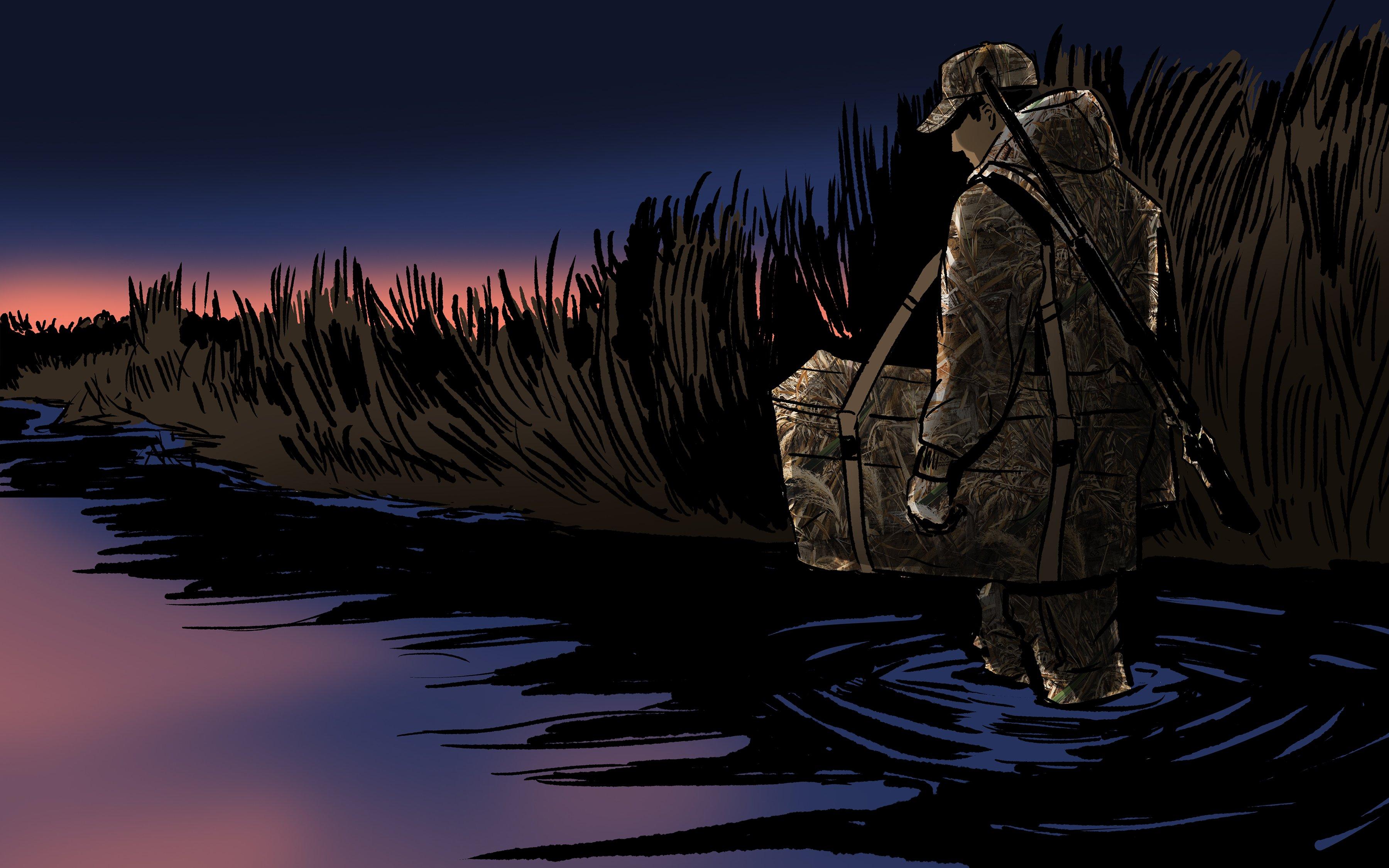Lost in the dark. Chest-deep mud. No guarantee of any shooting. But the promise of finding a hidden duck hole makes it worth it.
You have no memory of this place.
Lost amid a sea of cattails, you rub your hands together for warmth, trying to recall what you saw on the map. The channel should cut west, but thick bog says otherwise. You cannot go south, as flooded trees and thick willows prevent that. And your skiff is stuck. Still, with daylight 90 minutes away, you must at least try to push through to open water.
Abandoning the paddle, you reach ahead, grab fistfuls of cattails and pull yourself forward. Now you're atop the bog. Another pull nets a few more feet and a cold shower from the snow and ice atop the vegetation. But a small glimmer beckons, barely visible in the shrouded moonlight. Is that a channel? There's only one way to know. Two more pulls swing you through the frozen maze and into a narrow opening. You check your compass again, confirm you're still heading west and resolve to continue.
Grinning, you wonder whether the hardship will pay off. Long-shot duck hunting plans often morph quickly into memorable disasters. But today's outcome remains undetermined. So with yet-undeterred optimism, you slip the paddle into the frigid water and plow ahead.
Man Plans, God Laughs
The idea had seemed solid: Explore a new spot where springs and running water have concentrated the few mallards and black ducks that remain in this part of the country. And your initial scouting foray was encouraging. But as you're reminded, stumbling through strange, wild marshes in the dark differs greatly from navigating familiar or well-marked territory.
You think back to that picturesque North Dakota slough you'd hailed as a slam-dunk, with easy access and great cover. Your buddies had a good chuckle the next morning as you led them on a quarter-mile fool's march through muck and chest-deep water before giving up. And then there was the infamous jump-shooting expedition at a state wildlife area. After three panicked miles of battling berry brush and prickly ash, you finally stepped onto a gravel road, lost and exhausted. Thankfully, the warden gave you a ride to your vehicle — after suppressing his laughter and figuring out how you'd wandered so far off course.
Some hunting partners have chided you about your often-futile obsession with exploring new areas, especially when tried-and-true spots continued to produce. True, you'd argue, but every longtime hotspot was once a new one. And if not for curiosity and a can-do attitude, you might never have found those areas. Sure, they responded, but with years of experience and a long list of go-to hunting areas, the need for wanderlust has subsided. It's much easier to hunt familiar haunts, taking good days with the bad and waiting for better flights, knowing that adventure sometimes brings failure, but that persistence often trumps all else.
You've always thought that philosophy was a little lazy. You've observed and admired resourceful hunters who consistently seem to find hidden gems with unpressured birds. At the same time, you've seethed when unambitious pals stumbled into limits while you worked your tail off at a new spot and scratched down one teal. Stubborn, they'd called you. And they were right.
But stubbornness seems like genius when a far-flung plan comes together.
Onward
But enough. You probably have 200 yards to go, and it's threatening daylight. The channel has widened now, and you can paddle through easily. Here and there, a dogleg cuts left or right, but the course remains clear. And finally, as you break through one more swath of cattails, the channel gives way to a small slough. Beyond that, a large round pothole beckons. You've made it.
No time to waste. The air is still, so you toss out 11 decoys — all you could carry — in a loose spread and look for a spot to hide. A noisy hen mallard bursts from the pond's edge, quacking in alarm as her black form fades into the night. Two more flushes follow. At least a few ducks like this spot.
The shoreline bog is thick and frozen. Pushing your paddle against a muskrat hut, you try to muscle your way into a small crease. No go. Maybe you're better off circling around the point and entering from the other side. That seems easier, and you finally beach your skiff on a solid bog. Then, risking a swim, you ease out of the boat, drag it farther into cover and find a spot where you can stand in knee-deep water.
Only your hands still feel the morning chill. Removing your cap, you wipe sweat off your head and watch steam rise. It won't last, though. Soon, the bitter cold will creep back in, testing your resolve and perhaps ending the morning. But at least by then, you should know how the day will go.
After throwing three shells into your gun, you rise and scan the horizon. Ten minutes till shooting light. This could be a great hunt. Or it might suck. But either way, being in this new place just seems right. You remember the paraphrased words of turkey legend Dwain Bland, who said there's nothing more exciting than being dropped off in the dark at a spot you've never been.
So here you are.
To the Hunt
Your eyes glance skyward as the daydream ends. Those were whistling wings, and lots of them. Birds must be coming off the river to feed and loaf in these hidden holes and channels. And thanks to a silly idea and some grunt work, you're waiting for them.
Suddenly, dark blobs hover overhead. The first pass brings them almost to within range, but you hear primaries cutting air as the flock rises and then circles over another hole. Several break off and bank toward you. You quickly check your watch, and confirm it's legal to shoot. Slowly, you pick up the shotgun.
There — in front. Drake. A shot rings out, and it's on.
First time in, you think, grinning and shaking your head. For once, you made something work. And long after the details of your hunt's outcome have faded from memory, you'll recall the swift rush of anticipation and uncertainty you experienced as the journey began.
New spots and fresh adventures. Another stitch in the long tapestry of a hunting life. That might seem inconsequential to some, but you'll ultimately savor it far more than any pile of birds or band on your lanyard.
Click here for more Realtree waterfowl hunting content. And check us out on Facebook.








